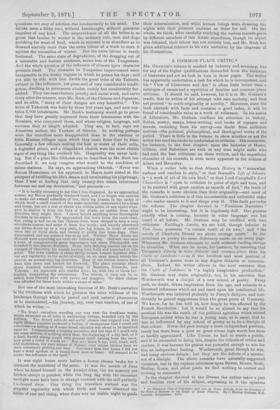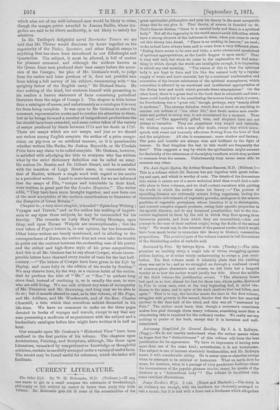A COMMON-PLACE CRITIC.*
Mit. GRAHAM'S volume is marked by industry and accuracy, but for any of the higher qualifications demanded from the historian of literature and art we look in vain in these pages. The writer has apparently undertaken a task for which he is incompetent, and his "View of Literature and Art" is often little better than a catalogue of names and a repetition of familiar and common-place criticism. It should be said, however, for it is to Mr. Graham's credit, that he writes of his attempt with rare modesty, and does not pretend " to much originality or novelty." Moreover, since the book abounds with facts and contains a good index, it will be found of considerable value as a work of reference. In his notice of Literature, Mr. Graham confines his attention to history, fiction, poetry, essays, letter-writing, and books of voyages and travels, excluding from his survey—no doubt from sufficient motives—the political, philosophical, and theological works of the period. There is little in the volume to show whether or not the writer has read the books he undertakes to criticize. His comments, for instance, in the first chapter, upon the histories of Hume, Gibbon, and Robertson are such as any man might make who had read the best criticisms on these writers, and the superficial character of his remarks is even more apparent in the notices of Alison and Macaulay.
When a writer tells us that Alison's History is " somewhat verbose and careless in style," or that BoswelPs Life of Johnson is "a work of art of its own kind," or that Lord Campbell's Lord Chancellors is "open to criticism in point of style and tone, and to be received with great caution as records of fact," the truth of the remarks is more obvious than their originality—and most of Mr. Graham's criticism is of this incontestible and unfruitful order —the reader assents to it and sleeps over it. This fault pervades the volume. The chapter devoted to "Fictitious Narrative " ought to be interesting, but it is hopelessly dull. One guesses exactly what is coming, because in other language one has heard it all before. Mr. Graham may be credited with two criticisms. Fielding's Amelia, we are told, though inferior to Tom Jones, possesses "a certain merit of its own," and "the novels of Charlotte Brontii are above average merit." Ia the criticisms on poetry the same deficiency meets us on every page. Whenever Mr. Graham attempts to walk without leading-strings he stumbles. What can he mean, for instance, by asserting that Thomson's Liberty is more didactic and common-place than his Castle of Indolence ! — as if the loveliest and most poetical of all Thomson's poems were in any degree didactic or common- place. Indeed, the writer allows in the next sentence that the Castle of Indolence is "a highly imaginative production." Mr. Graham may claim originality, too, in his assertion that Wordsworth was a disciple of a new school of poetry. Every poet, no doubt, draws inspiration from his age, and submits to a thousand influences which act and react upon his intellectual life. Wordsworth was indebted probably to Percy's lleliques, and inci- dentally he gained suggestions from the great poets of Germany. We know, for he has told us, how deeply he was affected by the French Revolution ; but it would be as absurd to say that his poetical life was the result of the political agitation which stirred European society when he was a young man, as to assert that he was so influenced by any school of poetry as to be a disciple of that school. Never did poet occupy a more independent position, rarely has there been a poet so great whose high worth has been so tardily appreciated. Like Turner, he had to create a public, and if he succeeded in doing this, despite the ridicule of critics and readers, it was because his genius was powerful enough to win for him an independent footing. Wordsworth, great though he was, had many obvious defects ; but they are the defects of a master, not of a disciple. The above remarks have naturally suggested comment, but in the copious criticisms upon Byron, Moore, Scott, Shelley, Keats, and other poets we find nothing to contest and nothing to commend.
In the chapter devoted to the Drama the author takes a just and familiar view of his subject, expressing in it the opinions
* An zustorical Rem of Literature and 41.6 in Oreai &tied ,ra from the Accession of The House of Hanover to the lido of Queen Yetturia, By Murray Graham, ICA. London: Lungamns, 1871.
which nine out of ten well-informed men would be likely to utter, though the meagre praise awarded to Joanna Belli°, whose tra- gedies are said to be above mediocrity, is not likely to satisfy her admirers.
In Mr. Trollope's delightful novel Dorchester Towers we are told that Mr. Thorne would discourse by hours together on the superiority of the ruder, Spectator, and other English essays to anything that has since been introduced in our Edinburghs and Quarterlies. The subject, it must be allowed, is full of matter for pleasant comment, and although the authors known as the Queen Anne men produced their best essays before the acces- sion of the Georges, the plan of Mr. Graham's work, to judge from the earlier and later portions of it, does not prohibit him from taking a full survey of his subject, commencing with "the sprightly father of the English essay," Sir Richard Steele. He does nothing of the kind, but contents himself with presenting to his readers a barren statement of facts concerning periodical literature from the reign of George I. The ohapter is little better than a catalogue of names, and unfortunately as a catalogue it is very far from beiug complete. It was open to Mr. Graham to select for comment, representative works and to confine his attention to them, but as he brings forward a number of insignificant productions the list should have been extended, and some notice taken of the variety of essays produced by Steele between 1714 and his death in 1729.
There are essays which are not essays, and just as we should not reckon among English essayists the author of a prize compo- sition on pig-iron or on artificial manure, so it is questionable
-whether writers like Burke, Sir Joshua Reynolds, or Sir Uvedale
Price have any claim to be called essayists. Mr. Graham, however, is satisfied with adjudging the title to everyone who has written what by the strict dictionary definition can be called an essay.
He notices Dr. Beattie and Dr. Gilbert Stuart, and he is satisfied with the insertion of Leigh Hunt's name, in connection with that of Hazlitt, without a single word with regard to his merits as a periodical writer. Lamb is more favoured, for we are informed that the essays of Elia, "unique and inimitable in their kind, were written in great part for the London Magazine." The writer adds, "They have been since brought together, and now form one of the most acceptable of the modern contributions to literature of the Essayists of Great Britain."
Chapter ix., a very short chapter, is headed" Epistolary Writing ; Voyages and Travels," and as the author has nothing of import- ance to say upon these subjects, he may be commended for his brevity. The remarks on Lady Mary Wortley Montagu, upon Gray, and upon Horace Walpole are unexceptionable ; but the view taken of Pope's letters is, in our opinion, far too favourable. Other letter-writers are barely mentioned, and in alluding to the correspondence of Burns, the author does not even take the trouble to point out the contrast between the enchanting ease of his poetry and the stilted and high-flown style of his prose compositions. And this is all Mr. Graham has to say about Cowper, whose incom- parable letters have charmed every reader of taste for the last half- century :—" The letters of Cowper have been given in his Life by Hayley, and more fully in the edition of his works by Southey." We may observe here, by the way, as a curious habit of the writer, that he prefixes the title of " Mr." or "Rev." to authors long since dead, instead of confining it, as is usually the case, to men who are still living. We can talk without any sense of incongruity of Mr. Tennyson and Mr. Browning, and long may we be able to do so ; but it sounds absurd to read, as in this volume, of Mr. Pope, and Mr. Addison, and Mr. Wordsworth, and of the Rev. Charles Churchill, a title which that scurrilous satirist discarded in his life-time. We have no comment to make on the three pages devoted to books of voyages and travels, except to say that any man possessing a modicum of acquaintance with the subject and a bookseller's catalogue before him might have written it in half an hour.
Our remarks upon Mr. Graham's "Historical View" have been confined to the first portion of his volume. The chapters upon Architecture, Painting, and Sculpture, although, like those upon Literature, unmarked by comprehensive knowledge or thoughtful criticism, contain in carefully arranged order a variety of useful facts. The record may be found useful for reference, which the index will facilitate.































 Previous page
Previous page